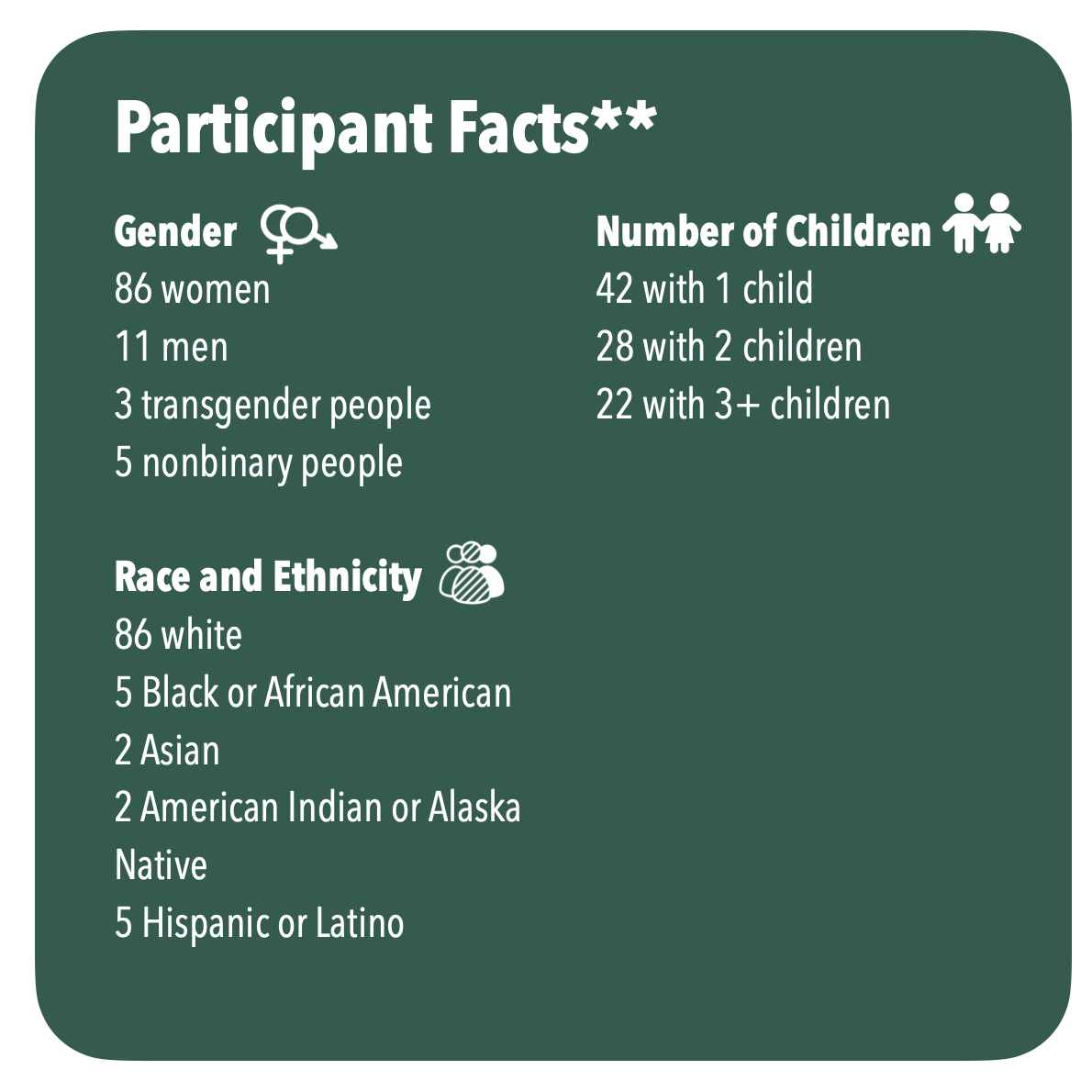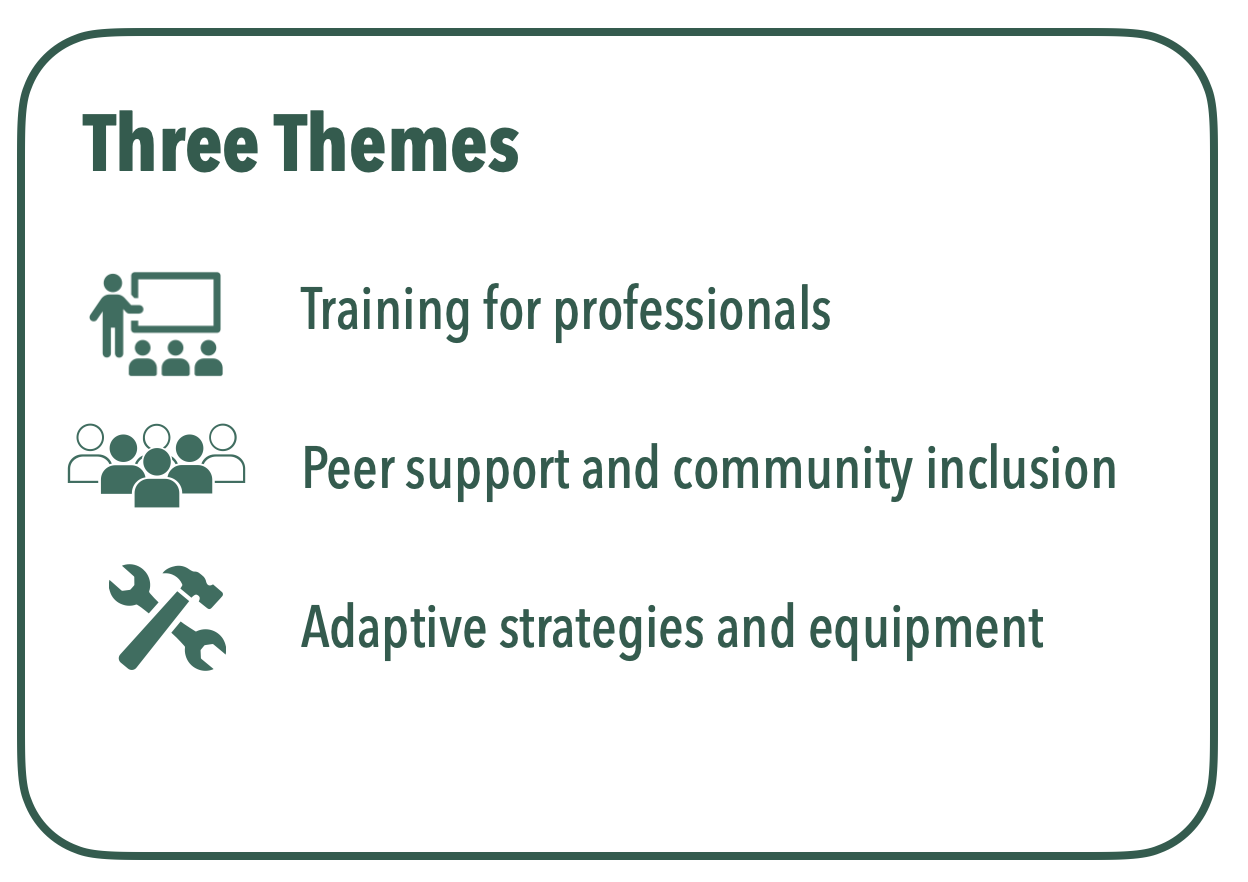Introduction
The National Research Center for Parents with Disabilities surveyed 109 people**—parents with disabilities and people who support them—to identify priorities for our future work. Of those participants, 88 were parents with disabilities, while 26 were professionals or advocates who work with parents with disabilities. Six people were people with disabilities considering becoming parents. The remaining participants fell into other categories, such as spouses or family members of parents with disabilities.

Disabled participants had a variety of conditions, including physical and orthopedic disabilities, chronic illnesses, psychiatric disabilities, blindness or low vision, Deafness or hearing loss, and cognitive disabilities (including intellectual and developmental disabilities).
What priorities did respondents choose?
Respondents identified 5 topics that are most important for research with parents with disabilities or training for professionals:
- Mothers with disabilities (72 votes)
- Community needs of parents with disabilities (69 votes)
- Helping parents with disabilities learn advocacy skills (66 votes)
- Working with the child’s school system (54 votes)
- Employment for parents with disabilities (53 votes)
Respondents provided recommendations to address some of the challenges they experience. Their recommendations highlight three themes: training for professionals, peer support and community inclusion, and adaptive strategies and equipment.

Training for Professionals
“Training and exposure for professionals is key. Once they know disabled parents actually exist and how best to support them, on-the-ground change happens. This needs to happen in concert with research.”
“The most important challenge for parents with disabilities is a prevailing attitude among educators, social workers, and the general public that parents with disabilities are less capable of caring for and raising children.”
“Training and education of social workers, teachers, healthcare workers, the medical profession, and the courts to understand that a parent with a disability can be, and often is, an even better parent for their child or children because of their commitment and dedication.”
“Parents with disabilities, especially mothers, are more likely to lose custody in court battles, more likely to experience coercion to stay in abusive relationships due to fear of losing custody, more likely to experience domestic violence, and more likely to live in poverty.”
“Others need to see that parents with disabilities can still be parents.”
“Training professionals, particularly child-welfare workers, but also teachers, to interact with parents with disabilities with knowledge and compassion.”
“It’s not us that needs changing; it is nondisabled people.”
“Working with medical and educational professionals to make them aware of how they can be of help to us in providing the best care for our children.”
“Professionals need to respect parents with disabilities and learn not to view them from a deficit perspective.”
Peer Support and Community Inclusion
“It would be really helpful to have peer-support programs. That way I could learn about the adaptations that other parents have made. Yesterday was an emotionally hard day for me, because I wasn’t able to snap my son into his stroller. I felt really alone and wanted to talk to someone struggling with similar issues.”
“I suggest that you use virtual focus groups of parents with disabilities to gather ideas, concerns, and information about their specific experiences.”
“I would like to meet other parents who have disabilities.”
“It’s important to elevate the voices of disabled parents instead of deciding for them what they need.”
“Activities offered for disabled and nondisabled in the community.”
“Establish mentoring or match-up programs for prospective parents and new parents.”
“I feel there is a lack of information available to the general public regarding disabilities and sadly that shows in our court system.”
“Peer support is very beneficial. Everything from sharing day-to-day tips and hacks to make life easier, to sharing information about legal rights, and information about community resources.”
Adaptive Strategies and Equipment
“There is no information on accessibility for parenting in general. My physical therapist had to show me how to change a diaper on crutches. I came up with the idea to use a baby carrier with her by myself. Outside parenting entirely, I have had to come up with seemingly no-brained accommodations like having a power chair after surgery instead of being bedbound during recovery. Abled people and providers just don’t know what to do.”
“Stigma is huge. People believing that we disabled cannot or should not be parents. Feeling very isolated. I can and have joined online support groups through social media, but having local parents with disabilities, and having examples for me as well as my kids would be important.”
“Create some sort of resource with parenting tips and tricks that’s easier to find or that can be recommended by doctors to people with less internet access. It’s too hard to find what you’re looking for.”
“Affordable adaptive equipment for daily living.”
“Accessible baby or kid items such as strollers or car seats.”
“The ongoing threat of others’ judgment of our parenting that could lead to an intersection with an unjust child-protective-services system that could result in the destruction of our family.”
“Lamaze classes and the equipment necessary to take care of a child should be designed with parents of all abilities in mind.”
** Numbers do not add up to 109 because some participants described themselves in more than one category (e.g., a parent with a disability was also a professional who works with other parents with disabilities; or a parent with more than one disability; or a person who is both male and transgender; or a person who is multiple races).
The National Research Center for Parents with Disabilities conducts research and provides training and technical assistance to improve the lives of parents with disabilities and their families. We are funded by the National Institute on Disability, Independent Living, and Rehabilitation Research (Grant #90DPGE0001) and are located at the Lurie Institute for Disability Policy at Brandeis University.
